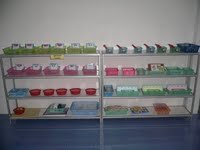

One of the major problems facing Burmese refugee and hill tribe children is the language barrier when they start school at age 6. At home, the children of refugee and hilltribe families speak either Burmese or one of the many hill tribe languages (with the exception of the Shan language, all unrelated to Thai), while at school they must speak, read and write Thai. In addition, some of these languages do not have a written form, so the children are unused to writing or reading.
The Montessori Programme helps refugee and hill-tribe children prepare for Thai schooling by converting existing Child Care Centres and nursery schools into centres which teach children Thai (as well as other disciplines and social skills) using a system based on the work of Dr Maria Montessori. (Learn more about the Montessori method)
History of the project

In 2003, Paul Hancock and Patricia Solar visited a nearby project for refugee and hill-tribe children where they saw Montessori child-centred teaching techniques being used with considerable success to teach pre-school hill-tribe children to read and write Thai, as well as elementary maths and other useful subjects.
They thought this was an idea that could be introduced with advantage to other areas, so they arranged a study tour for some interested teachers from the Sahasat School, Chiang Rai, (which has 1,800 hill-tribe pupils).
In May 2004, Khom Loy offered to sponsor an instructor/teacher, a teacher training course, and the purchase of teaching equipment for one year at the school. Each year, new schoolrooms have been converted and more trainers recruited and trained.
Current news
Eight years on (as of mid-2012) 41 school rooms/child daycare centres have been converted or are in the course of conversion), and a total of approximately 1,000 children are benefitting each year. In addition, a new base has been established in Mae Sot (on the Thai/Burma border 500km SW of Chiang Rai) where an estimated 100-200,000 Burmese refugees live in the community with little access to education. Further rooms will be converted later in 2012. We now have 8 teacher trainers, one volunteer (a trained Montessori teacher from Indonesia) and as well as a project manager to oversee operations. New Burmese-speaking staff are being recruited and trained to increase the number of rooms we can convert in Mae Sot. Measurement of the outcomes show that children are developing not only academically but also socially as a result of the child-centred learning methods. For a recent video made by volunteer Tony Rieck see here.
Innovative teaching materials

Over the years Khom Loy has also designed a range of low-cost Montessori equipment which will allow the programme to be rolled out more generally. (Our first classrooms at Sahasat cost about US$3,000 to fully renovate and equip, the cost at Huay Khom, our second location, was nearly halved. We have since been able to develop low-cost equipment to the point that the three most recent Child Development Centers were opened for under $500 per classroom. Our aim is to reduce this to less than US$200 with the continued use of local materials and laminated paper/cardboard materials made by teachers and other volunteers.)
Future plans
In addition to its recently started new project in Mae Sai, and expanding the program to other village schools, Khom Loy would like to start an academy for teachers as well as a workshop to make the equipment, so that the program can expand over a larger area.
Another pilot program is using Montessori methods to teach English to grades 1 and 2 (aged 6-8). Early results show that children learn English as well as Thai very fast when they can play with Montessori-like toys involving associating pictures and words.
Thanks to our Donors
We are grateful to Planet Wheeler Foundation, Dr Richard Haugland/Starfish Country Home School Foundation, Nina & John Cassils/CW Asia Fund, Kenoli Foundation, Canada Fund, Thailand, David Williams/The Popocatepetl Trust, Andrew and Liz Johnson, Elisabeth and Conor Kehoe, Pieter-Maarten Feenstra, together with many other private donors for their support of this programme since its inception.